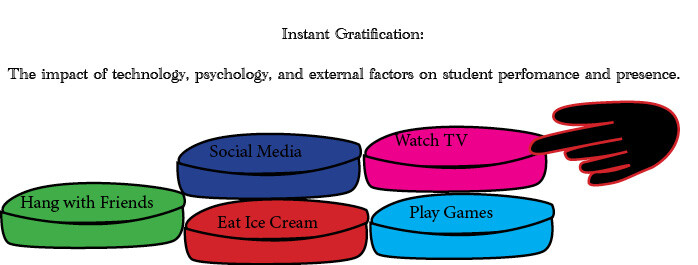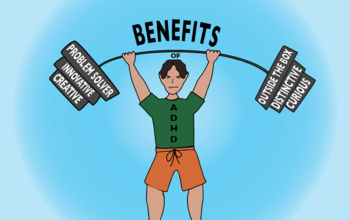(How the need for instant gratification is shaping the lives of high school students today.)
By Trey Kollitides
Class of 2023
In today’s landscape, high school students are bombarded with distractions as they navigate the vigorous and dynamic landscape of academics and extracurricular activities. The desire for instant gratification has become stringent on individuals’ ability to focus on tasks and be present in the classroom. This phenomenon contributes to an environment where students struggle to engage in their education thoroughly and are increasingly influenced by technology, psychological factors, and external influences, making an everlasting impression on the youth.
Instant gratification refers to the preference for immediate rewards or pleasures, often at the expense of long-term goals or well-being. In the context of high school students, this might mean checking social media or playing video games instead of studying or completing assignments.
At its core, instant gratification is a concept that involves a person getting what they want without having to put in the effort truly. In many cases, it leads to instant positive outcomes, such as the satisfaction of completing a task quickly or achieving a menial goal. However, inevitably it leads to negative results. Many students have become increasingly dependent on this type of immediate satisfaction and may need help focusing on long-term goals.
These students have yet to realize the opportunities they are letting go of by not being present and completing assignments themselves. It yields far more meaning and valuable life lessons. To be true to oneself, do the hard thing not only because it will make you a better person but because you will genuinely learn something. Many students are still determining how some classes apply to life; however, it’s relatively simple;
We all have to do hard things; the thing about hard things is they’re hard.
And they’re not for the meek.
For example, students may become less interested in academics and extracurricular activities as they become more accustomed to getting what they want. This can lead to lower grades and decreased motivation and enthusiasm for learning. Moreover, this type of thinking can have a lasting impact on the future of these students. By focusing on immediate gratification, they may miss opportunities for long-term success and development.
The increased prevalence of instant gratification in high school students is primarily due to their introduction to technology and media. With the ever-expanding array of digital devices and platforms, young people are exposed to different content designed to be engaging, easily accessible, and, often, even addictive. Students are embroidered in an ineffectual cycle, seeking out, consuming, and quickly forgetting content. The consequences of this can be severe, as it can lead to a lack of focus and motivation in other areas of life.
Technology: The Double-Edged Sword
Today every student has a smartphone intertwined with their daily lives, providing access to social media platforms like Instagram, Snapchat, and TikTok. Students might focus more on their devices, scrolling through an endless content stream rather than engaging with classroom lessons. This constant barrage of information makes it difficult for students to concentrate on their work. Beyond social media, the internet offers a wealth of distractions, from video games to streaming services like Netflix and YouTube. In another classroom, students might watch their favorite show or play games on their laptops instead of paying attention to the lecture, leading to poor academic performance.
Psychology: The Quick-Fix Mentality
Students often procrastinate, putting off assignments until the last minute. For example, students prefer watching videos or chatting with friends rather than working on an essay. Procrastination can be exacerbated by technology, as it provides an abundance of tempting distractions.
External Influences: The Pressure to Succeed
Today’s social atmosphere causes students to constantly check their phones for updates and stay engaged with their peers online. This might manifest in a classroom where students need help to check their phones during a group discussion or while doing homework, missing valuable material: diminishing their ability to expand their knowledge. Additionally, the pressure to succeed academically, fueled by parental and personal expectations, can lead students to seek out distractions to cope with stress.
Redefining Success
To combat the impact of instant gratification, educators and parents must work together to create an environment that promotes balance and mindfulness. This may include introducing activities that require more effort and patience or emphasizing the importance of long-term goals and objectives. Schools have implemented various strategies, such as Promoting healthy technology use, Mindfulness and Meditation, time management skills, a healthy growth mindset, and reducing performance pressure.
In all, Everyone should be more cognizant of their actions. Are you mindlessly going through the motions? Are you a cog in the machine loop of technology and social media companies? Every person can set boundaries for technology use and try to pay attention to each other and, most importantly, themselves.
“Knowing yourself is the beginning of all wisdom.”–Aristotle
“Knowing others is intelligence; knowing yourself is true wisdom.”–Lao Tzu
Ultimately, by understanding and addressing the issue of instant gratification, high school students can be better equipped to succeed both during and after their education. By understanding the impact of instant gratification on high school students and taking steps to address its consequences, we can help students develop healthier habits, focus better on their education, and cultivate a more balanced approach to life.




